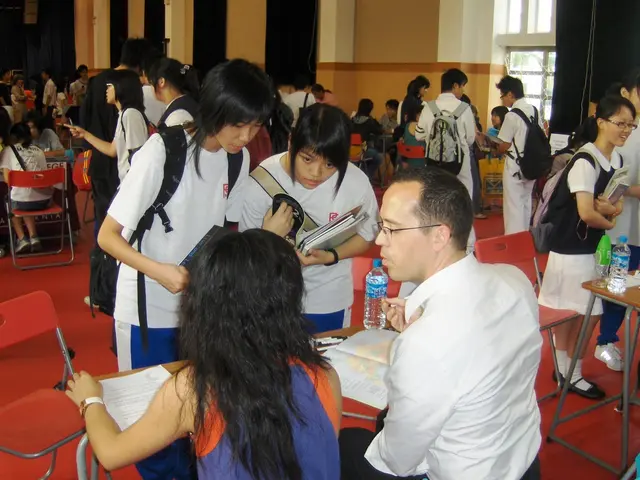Baku Chats Unveiled: SPD and CDU Politicians Lock Horns with Putin's Pals
SPD and CDU politicians convene with Putin's trusted advisors.
In an exposed rendezvous, German politicians from SPD and CDU parties were reportedly whisked away to Baku, Azerbaijan, for clandestine meetings with Russian representatives. The trip, made public, has sparked heated debates and criticisms within the political sphere. Now, the German delegates stand firm with a public defense.
The encounter, unveiled by ARD's "Kontraste" and "Die Zeit" weekly newspaper, took place in mid-April and involved a German contingent, consisting of SPD MP Ralf Stegner, former Federal Chancellery head Ronald Pofalla (CDU), former Brandenburg SPD Minister President Matthias Platzeck, former North Rhine-Westphalia CDU Europe Minister Stephan Holthoff-Pförtner, and long-time CEO of the "Petersburg Dialog," Martin Hoffmann. The Russian side was led by former Russian Prime Minister and current Gazprom Supervisory Board Chairman Viktor Zubkov, together with Chairman of the Russian Human Rights Council, Valery Fadeyev—a figure blacklisted by the EU for propagating war propaganda and misinformation[1].
Since at least April 2024, there have been at least three such secretive meet-ups, with discussions likely revolving around reviving the infamous "Petersburg Dialog"[2]. This controversial dialogue format between Germany and Russia, pioneered in 2001 by then-Chancellor Gerhard Schröder and Kremlin chief Vladimir Putin, was effectively frozen in 2022 following Russia's devastating assault on Ukraine.
"Was His Smartphone Smuggling Secrets?"
The revelation of the Baku meetings quickly ignited a furore in Berlin's political scene, with Stegner, due to his position in the parliamentary control committee for intelligence services in the last Bundestag, finding himself in the hot seat[3]. CDU MP Roderich Kiesewetter posed pointed questions towards the SPD politician, "It's unacceptable for us to delve deeply into the security policy of the Federal Republic of Germany and our intelligence services' capabilities on one hand, while we become the main attraction at Russian debate events on the other," Kiesewetter asserted to "Kontraste" and "Die Zeit." "Did he travel with a second phone? How did he safeguard himself?"
Russian analyst Sabine Fischer of the SWP believes the meeting undermines the tensed sanctions imposed upon Russia, with the primary Russian objective being to forge influence channels within German politics[1].
In a joint rebuttal to the allegations, Stegner, Pofalla, Platzeck, and Holthoff-Pförtner defended their interactions with Russian dignitaries in Baku. "Establishing dialogue contacts with all global factions, including Russia, is vital for sound diplomacy, especially during escalating tensions, conflicts, and wars," the statement, procured by the "Süddeutsche Zeitung," reads[1]. The statement further clarifies that such conversations are confidential, but not deceitful, reiterating that they have no authorization for hidden negotiations or any involvement of government agencies in these discussions. It is claimed that politically responsible parties were informed about these conversations, but government representatives neither initiated nor supported the talks[1].
[1] ntv.de, jpe
- Azerbaijan
- Russia
- Germany
- Diplomacy
- Gazprom
- Ralf Stegner
- Despite the controversies that ensued, the German politicians - Ralf Stegner from SPD, Ronald Pofalla from CDU, Matthias Platzeck (former Brandenburg SPD Minister President), Stephan Holthoff-Pförtner (former CDU Europe Minister), and Martin Hoffmann - defended their clandestine meetings in Baku, Azerbaijan, stating that forging dialogue contacts with global factions is crucial for diplomacy during escalating tensions, conflicts, and wars.
- The CDU MP, Roderich Kiesewetter, questioned SPD's Ralf Stegner, involved in the parliamentary control committee for intelligence services, over his clandestine ties with Russian representatives in Baku, expressing concerns about potential security breaches and the apparent double standard of German politicians attending Russia's debate events while scrutinizing German security policy.
- The exposé of the Baku meetings by ARD's "Kontraste" and "Die Zeit" weekly newspaper revealed the attendance of high-ranking German and Russian officials, including Viktor Zubkov (Gazprom Supervisory Board Chairman) and Valery Fadeyev (Chairman of the Russian Human Rights Council, blacklisted by the EU for propagating war propaganda and misinformation).
- The Russian objective of the secretive meetings, according to analyst Sabine Fischer of the SWP, was to establish influence channels within German politics, potentially undermining the tensed sanctions imposed upon Russia following the Russo-Ukrainian tensions.
- The clandestine meetings in Baku took place at least thrice since April 2024, with discussions likely revolving around reviving the controversial "Petersburg Dialog" format between Germany and Russia, which was effectively frozen in 2022 following Russia's invasion of Ukraine.







